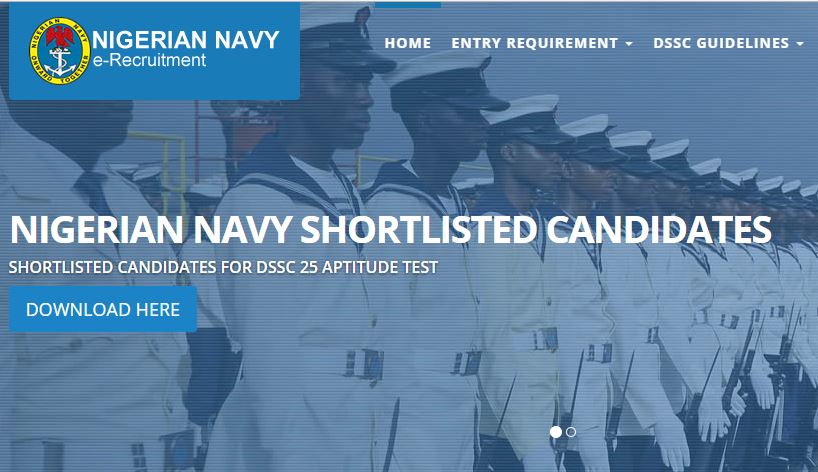Official: Nigerian Navy DSSC List of Shortlisted Candidates for 2020 Aptitude Test Here.
Nigerian navy shortlisted candidates’ list released. The NN Direct Short Service Course (DSSC) 28 aptitude test is scheduled to hold in 8 centres across the nation on Saturday, 7th November 2020.
Candidates are to check for their names below and proceed to the centres indicated, all centres of choice were upheld except for discrepancies.
Shortlisted applicants are to report at their chosen venues to sit for the aptitude test not later than 0700hrs on 7 November 2020 with the following:

How To Check Nigerian Navy Shortlist 2020.
Candidates who applied for the Nigerian navy DSSC 2020 recruitment are to check for their names from the pdf document below;
>> https://joinnigeriannavy.com/wp-content/uploads/2020/11/LIST-OF-SHORTLISTED-CANDIDATES-FOR-THE-NIGERIAN-NAVY-DSSC-28-APTITUDE-TEST-SCHEDULED-FOR-7-NOVEMBER-2020.pdf
Candidates are to come with;
- Photocopies of Degrees/Diplomas (Those with foreign institutions credentials are to submit the certificates in duplicates).
- Parents/Guardian Consent Form.
- NYSC Discharge/Exempt Certificates.
- 2 Coloured Passport Photographs.
- Writing materials (2B Pencils, Pens, and Eraser).
- Face Masks.
ABOUT NN: The origin of the Nigerian Navy could be traced to the Marine Department of the Royal Navy established in 1887 as a quasi-military organization, which combined the duties of the present-day Nigerian Ports Authority (NPA), the Nigerian Inland Waterways Authority and the Nigerian Navy.
Elements of the Marine Department took part in military operations against the Germans in Cameroun during the First World War between 1914–1918.
However, the colonial administration did not consider it necessary to establish a proper navy, as they believed that it was the duty of the Royal Navy to give naval protection to Nigeria. Also, the Marine Department was considered adequate to look after security of the ports and coastal approaches and provide harbour services for Royal Navy ships on West African patrols.
This was the situation until the end of the Second World War in 1945.
